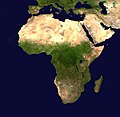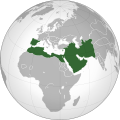Portal:Africa



Africa is the world's second-largest and second-most populous continent after Asia. At about 30.3 million km2 (11.7 million square miles) including adjacent islands, it covers 20% of Earth's land area and 6% of its total surface area. With nearly 1.4 billion people as of 2021, it accounts for about 18% of the world's human population. Africa's population is the youngest among all the continents; the median age in 2012 was 19.7, when the worldwide median age was 30.4. Based on 2024 projections, Africa's population will exceed 3.8 billion people by 2100. Africa is the least wealthy inhabited continent per capita and second-least wealthy by total wealth, ahead of Oceania. Scholars have attributed this to different factors including geography, climate, corruption, colonialism, the Cold War, and neocolonialism. Despite this low concentration of wealth, recent economic expansion and a large and young population make Africa an important economic market in the broader global context, and Africa has a large quantity of natural resources.
The continent includes Madagascar and various archipelagos. It contains 54 fully recognised sovereign states, eight cities and islands that are part of non-African states, and two de facto independent states with limited or no recognition. This count does not include Malta and Sicily, which are geologically part of the African continent. Algeria is Africa's largest country by area, and Nigeria is its largest by population. African nations cooperate through the establishment of the African Union, which is headquartered in Addis Ababa.
Africa is highly biodiverse; it is the continent with the largest number of megafauna species, as it was least affected by the extinction of the Pleistocene megafauna. However, Africa is also heavily affected by a wide range of environmental issues, including desertification, deforestation, water scarcity, and pollution. These entrenched environmental concerns are expected to worsen as climate change impacts Africa. The UN Intergovernmental Panel on Climate Change has identified Africa as the continent most vulnerable to climate change.
The history of Africa is long, complex, and varied, and has often been under-appreciated by the global historical community. In African societies the oral word is revered, and they have generally recorded their history via oral tradition, which has led anthropologists to term them "oral civilisations", contrasted with "literate civilisations" which pride the written word. African culture is rich and diverse both within and between the continent's regions, encompassing art, cuisine, music and dance, religion, and dress. (Full article...)
Selected article –

Alodia, also known as Alwa (Greek: Αρουα, Aroua; Arabic: علوة, ʿAlwa), was a medieval kingdom in what is now central Sudan. Its capital was the city of Soba, located near modern-day Khartoum at the confluence of the Blue and White Nile rivers.
Founded sometime after the ancient Kingdom of Kush fell, around 350 AD, Alodia is first mentioned in historical records in 569. It was the last of the three Nubian kingdoms to convert to Christianity in 580, following Nobadia and Makuria. It possibly reached its peak during the 9th–12th centuries when records show that it exceeded its northern neighbor, Makuria, with which it maintained close dynastic ties, in size, military power and economic prosperity. Alodia was a large, multicultural state administered by a powerful king and provincial governors appointed by him. The capital Soba, described as a town of "extensive dwellings and churches full of gold and gardens", prospered as a trading hub. Goods arrived from Makuria, the Middle East, western Africa, India and even China. Literacy in both Nubian and Greek flourished. (Full article...)
Featured pictures –
Did you know (auto-generated) -

- ... that Bea Hines, the first African-American woman to become a reporter at the Miami Herald, was sent to report on a riot on her first day at work?
- ... that Muhsin Hendricks of South Africa has been described as "the world's first openly gay imam"?
- ... that South African civil rights activist Thambi Naidoo was arrested along with Mahatma Gandhi and sent outside of Transvaal for refusing to register?
- ... that Saint Augustine died during the Vandal conquest of Roman Africa?
- ... that Francis W. Joaque was one of the earliest African photographers?
- ... that opera singer Charles Holland spent much of his career in Europe as opportunities in classical music for African Americans were limited?
Categories
Selected biography –
Jean-Baptiste Philippe Ouédraogo (French pronunciation: [ʒɑ̃ batist filip wedʁaɔɡo]; born 30 June 1942), also referred to by his initials JBO, is a Burkinabé physician and retired military officer who served as President of Upper Volta (now Burkina Faso) from 8 November 1982 to 4 August 1983. He has since mediated a few national political disputes and operates a clinic in Somgandé.
Ouédraogo received his early education in Upper Volta before joining the Upper Voltan Army and studying medicine abroad. After working in healthcare, he was appointed chief medical officer of the Ouagadougou military camp. He participated in the November 1982 coup d'état and shortly thereafter assumed the presidency. More ideologically moderate than most of his comrades, Ouédraogo did not command much popular support and governed the country amid an unstable political climate. He was for private ownership of businesses. A protracted dispute with Prime Minister Thomas Sankara resulted in his removal from power in a coup in August 1983 and imprisonment. He was released in 1985 and resumed medical work. He opened a clinic in Somgandé in 1992, which he still operates. In the 2010s, he acted as a mediator between opposing political factions. (Full article...)
Selected country –
 |
 |
||

| |||
Ghana, officially the Republic of Ghana, is a country in West Africa. It borders Côte d'Ivoire to the west, Burkina Faso to the north, Togo to the east, and the Gulf of Guinea to the south. It was inhabited in pre-colonial times by a number of ancient kingdoms, including the Ga Adangbes on the eastern coast, the inland Empire of Ashanti and various Fante states. Trade with European states flourished after contact with the Portuguese in the 15th century, and the British established a crown colony, Gold Coast, in 1874. Upon achieving independence from the United Kingdom in 1957, the name Ghana was chosen for the new nation to reflect the ancient Empire of Ghana that once extended throughout much of west of Africa.
Ghana is a republic and member of the Commonwealth of Nations. Its head of state is President John Agyekum Kufuor, the ninth leader of the country since independence. The government sits at Osu Castle. The Parliament of Ghana is unicameral and dominated by two main parties, the New Patriotic Party and National Democratic Congress. (Read more...)
Selected city –

Lusaka (/luːˈsɑːkə/ loo-SAH-kə) is the capital and largest city of Zambia. It is one of the fastest-developing cities in southern Africa. Lusaka is in the southern part of the central plateau at an elevation of about 1,279 metres (4,196 ft). As of 2019[update], the city's population was about 3.3 million, while the urban population is estimated at 2.5 million in 2018. Lusaka is the centre of both commerce and government in Zambia and connects to the country's four main highways heading north, south, east, and west. English is the official language of the city administration, while Bemba, Tonga and Nyanja are the commonly-spoken street languages. The earliest evidence of settlement in the area dates to the 6th century AD, with the first known settlement in the 11th century. It was then home to the Lenje and Soli peoples from the 17th or 18th century. The founding of the modern city occurred in 1905 when it lay in the British protectorate of Northern Rhodesia, which was controlled by the British South African Company (BSAC). The BSAC built a railway linking their mines in the Copperbelt to Cape Town and Lusaka was designated as a water stop on that line, named after a local Lenje chief called Lusaaka. White Afrikaner farmers then settled in the area and expanded Lusaka into a regional trading centre, taking over its administration. In 1929, five years after taking over control of Northern Rhodesia from the BSAC, the British colonial administration decided to move its capital from Livingstone to a more central location, and Lusaka was chosen. Town planners including Stanley Adshead worked on the project, and the city was built out over the subsequent decades. (Full article...)
In the news
- 12 June 2025 –
- The death toll in the flooding caused by heavy rainfall and snowfall from a winter storm in Eastern Cape province, South Africa, increases to 57, with several others still missing. (ABC News)
- 12 June 2025 – Constitutional crisis in Somalia
- Somalia's federal government calls for the dissolution of the C6+ international coordination framework, arguing it is outdated and misrepresents the country’s current political and security progress. In a letter to UN Special Representative James Swan, the government stated that Somalia, now a sovereign state with functioning institutions, no longer needs its involvement. Despite ongoing challenges, the government seeks bilateral partnerships based on mutual respect, deeming the C6+ obsolete. The framework includes UN, AU, EU, IGAD, US, and UK. (Garowe Online) (ChimpReports) (Hiiraan Online)
- 12 June 2025 –
- Police fire tear gas at demonstrators gathered in Nairobi, Kenya, to protest against the Kenya Police and its chief, Eliud Lagat, after blogger Albert Ojwang is confirmed to be killed in custody by the police force, demanding Lagat's resignation. (DW)
- 11 June 2025 – Mediterranean Sea migrant smuggling
- At least eight migrants are found dead and 22 others are missing as the United Nations International Organization for Migration and the Djiboutian government launch a joint rescue operation after migrants were forced off a boat and forced to swim to shore off the coast of Djibouti. (AP)
- 11 June 2025 –
- At least 49 people are killed, including four schoolchildren, in flooding caused by heavy rainfall and snowfall in a winter storm in the Eastern Cape of South Africa. (DW) (BBC News)
- 10 June 2025 – 2025 Kenya bus crash
- Five tourists are killed and 35 others are injured in a bus crash in Gichage, Nyandarua County, Kenya. (Gulf News) (Economic Times)
Updated: 2:05, 13 June 2025
General images -
Africa topics
More did you know –

- ...that the 1459 Fra Mauro map (pictured) reports that "a junk from India" rounded the Cape of Good Hope in 1420, around 70 years before the navigations of Vasco da Gama?
- ...that the 1998 Sudan famine was caused by human rights abuses in the midst of the Second Sudanese Civil War?
- ...that a smokie is a West African delicacy made by blowtorching the carcass of a sheep or goat without removing its fleece?
- ...that Anne-Marie Nzié, a Cameroonian bikutsi singer, dedicated the song Liberté to President Paul Biya and his party, the Cameroon People's Democratic Movement?
Related portals
Major Religions in Africa
North Africa
West Africa
Central Africa
East Africa
Southern Africa
Associated Wikimedia
The following Wikimedia Foundation sister projects provide more on this subject:
-
Commons
Free media repository -
Wikibooks
Free textbooks and manuals -
Wikidata
Free knowledge base -
Wikinews
Free-content news -
Wikiquote
Collection of quotations -
Wikisource
Free-content library -
Wikispecies
Directory of species -
Wikiversity
Free learning tools -
Wikivoyage
Free travel guide -
Wiktionary
Dictionary and thesaurus


























































































